African Goddesses and West African Societies is an exploration of the African religion to understand what African goddesses are and how Western African society relates to them. In this post, I explore the existence of African Goddesses, which Nigerians refer to as Orisha, and their connections with the people of West Africa.
Who are the African Goddesses?
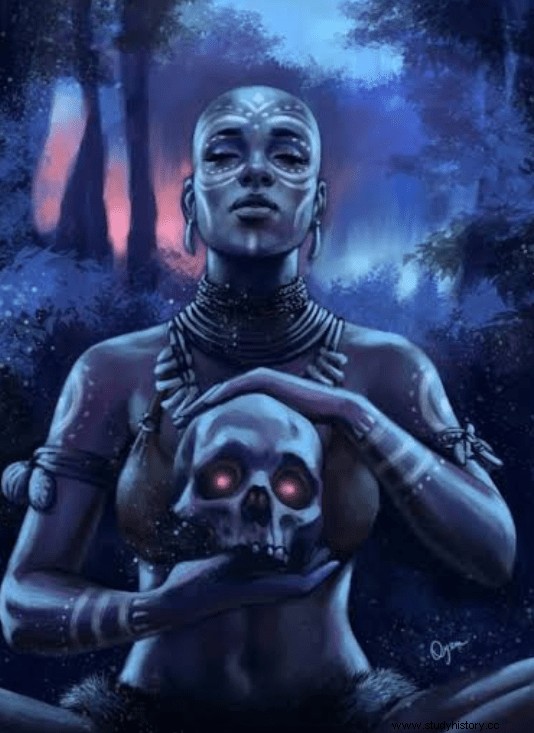
Orisha or African goddesses came into being, in the nature of things, through the divine order of the universe. That is why they are creative beings. And as creative beings, they are subordinate to the highest being. Essentially, African goddesses cannot survive without the highest being. This is because they are dependent, gain power and are subject to the Supreme Being. Furthermore, they are the manifestations of the attributes or attributes of the highest being.
Who is the supreme being for West Africans?
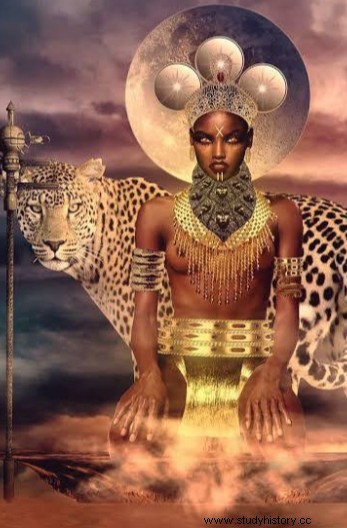
The supreme being for West Africans is 'Olorun':the king of heaven, the gods, the heavens, the earth and the universe. It is a king who guards, guides and helps his people in difficult times. There are different names that Africans use to describe the supreme being. For example, Yoruba of Nigeria calls this force 'Olodumare'. This means that the king or a unique chief who holds the ghost has authority and has the quality that is transcendent with value. And at the same time permanent, unchangeable and reliable. In addition, Africans believe that the supreme being is EVERYTHING, and neither he nor she.
The creation of Orisha or African goddesses
So why did the highest being create African goddesses? Oral stories and recently published articles say that Africans believe that the highest being used to live among his people. But then the people committed many sins, and then the highest being decided to ascend to heaven. As a result, the Supreme Being created goddesses and gods to take care of humans while they were in heaven.
According to indigenous people in West Africa, there are many Orishas among them. The reason is because there are many problems, activities and experiences with people that Orishas participate in daily. The Orishas have added powers, such as power to control the earth, rain, fire, and many other related spirits. But in this post, I look at eight Orishas who are related to the people of West Africa.
Orisha explained from the perspective of West African society
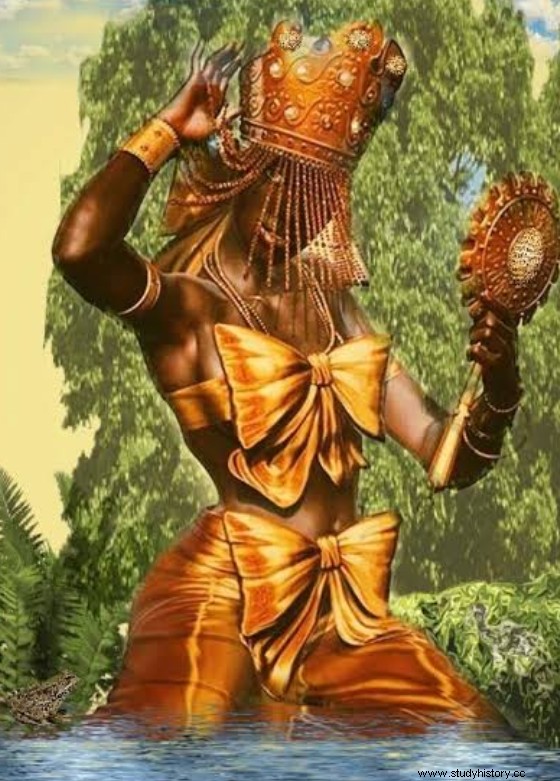
Orisha is the African goddess of Yoruba in southwestern Nigeria. The sole purpose of Orisha is to maintain peace between humanity and the forces of nature that ordinary people cannot control. She controls the water as rivers and lakes and other related forces of nature.
Yoruba is one of the ten largest religions in the world, consisting of over one hundred million global priests. Yoruba looks at Orisha's head and explains the head in the following terms:first, the main part, which refers to the visible physical head of a person. According to them, the visible physical head acts as the vessel for the invisible head. The invisible head is the person's inner spirit and the deepest part of a person's personality. Therefore, the invisible head controls, guides, and controls the person's actions.
Second, the witness, as they call the house to the head. The witness is the crown that covers the house of the head, and therefore the crown is a sanctuary. This crown is covered with shells and the color indicates purity and the character of the highest being. Third, the shells, which symbolize wealth. Yoruba uses a head as a metaphor for superiority and chief. And West African societies worship Orisha who live within the natural phenomena.
Three categories of Orisha
The Nigerian scholar Omosade Awulalu divides Orisha into three categories, which are:1. Divinity; 2. Divine ancestors; and 3. Personalized forces of nature or elements.
1. Antiquities existed long before the creation of the world.
2. Divine ancestors are kings, heroes, heroines, warriors and the founders of the city who lived among the people. These gods have a great influence on the lives of Yoruba through their contributions to culture and social life. These gods had a unique way of controlling the forces of nature by sacrificing and sacrificing. They disappeared on earth by sinking underground, ascending to heaven in chains and later turning to stone.
The people of West Africa interpret this transformation as the birth of the Orishas. After the transformation, the children continued to sacrifice like them. And this tradition continues to this day.
Personified natural forces or elements from the natural world are Orishas that West African people relate to on a daily basis. They play an important role and perform various functions for the Yorubans. As peacemakers, they maintain and maintain peace between humanity and the forces of the natural world.
Osun-Osogbo Festival
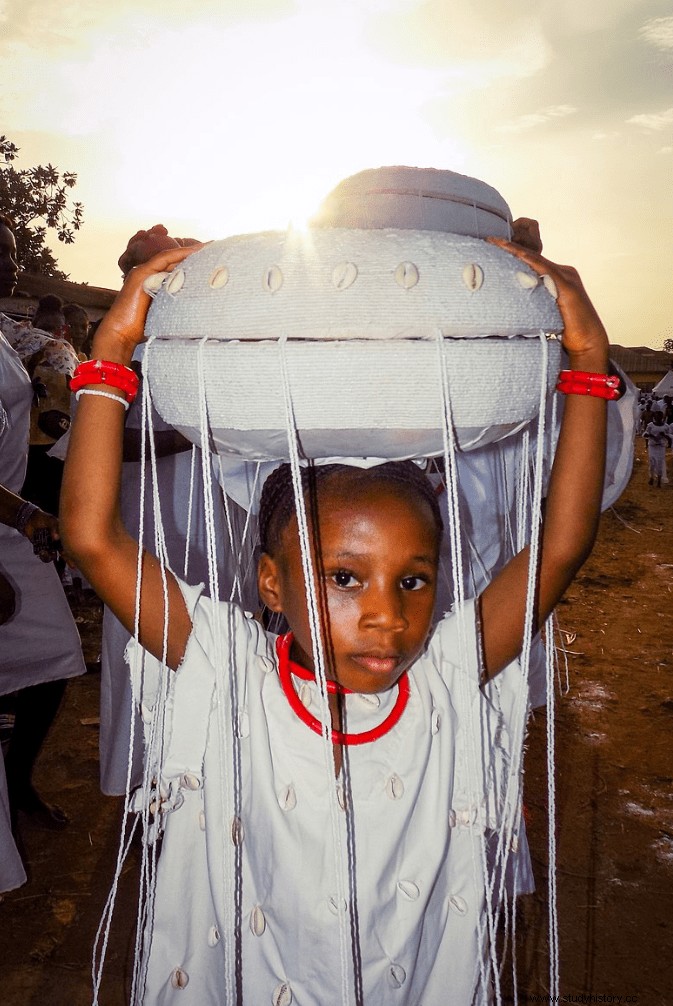
Osun is an Orisha who resonates with the manifestations of Yoruba in West Africa in Nigeria. The Yorubans worship and respect Osun because she acts as a mediator between them and the rivers. She also helps them with things like divinity, femininity, beauty and love. Understandably, the Osun River in Nigeria bears her name, and people believe she protects and leads the river. Until today, Yoruba in Nigeria celebrates her every August at the Osun-Osogbo festival which lasts for two weeks. During the two-week celebration, her devotees leave her offerings and perform ceremonies on freshwater bodies.
Osun followed the call from the highest being
Let's take a look at how Osun became an important deity for the people of West Africa. Assuming the highest being is a place out there looking at the earth. After some thought, the highest being calls Osun and sends her to earth to create a world of male gods.
Upon arrival on earth, the male gods admire her beautiful appearance and do not appreciate and accept her abilities. Osun is offended and goes to the moon. As a result, the earth dries out and the male gods seek advice from the highest being. For this reason, the highest being shouts at them and reminds them that the earth needs Osun's help. Consequently, The Supreme Being calls Osun to earth, and like the love, beauty, and abilities she resembles, Osun restores the earth to life. That's why people honor and respect her for her contribution to the world.
Oya is an Orisha for change

Contrary to many people's beliefs that ancient African stories are a myth, African goddesses and West African societies continue to practice culture in its immediate context. For example, Yoruban women urge Oya Orisha to settle disputes in their favor. Oya is the Orisha of the weather and the most powerful. As a result of her story and what it means, women look up to her to bring about changes in their relationships. That is why they call her an Orisha for change who uses the sword to pave the way for new growth. They also believe that Oya takes care of the recently deceased and helps them to rise from life.
The symbolic meaning of Oya for Yoruban women
Yoruban women put their trust in Oya based on the story of Oya. As it happens in the breathing areas, the great mermaid, also known as the goddess Yemaya, gives birth to Oya. Then time passes and Oya finds out that she is infertile. As in all situations that women experience, this information does not suit her well. And she comes up with a plan and trusts her abilities to change the situation. Determined, she takes a holy cloth and sacrifices. Miraculously, Oya gives birth to nine children, thus changing her situation. Thus, Yoruban women trust and honor her.
Olokun controls the water spirits
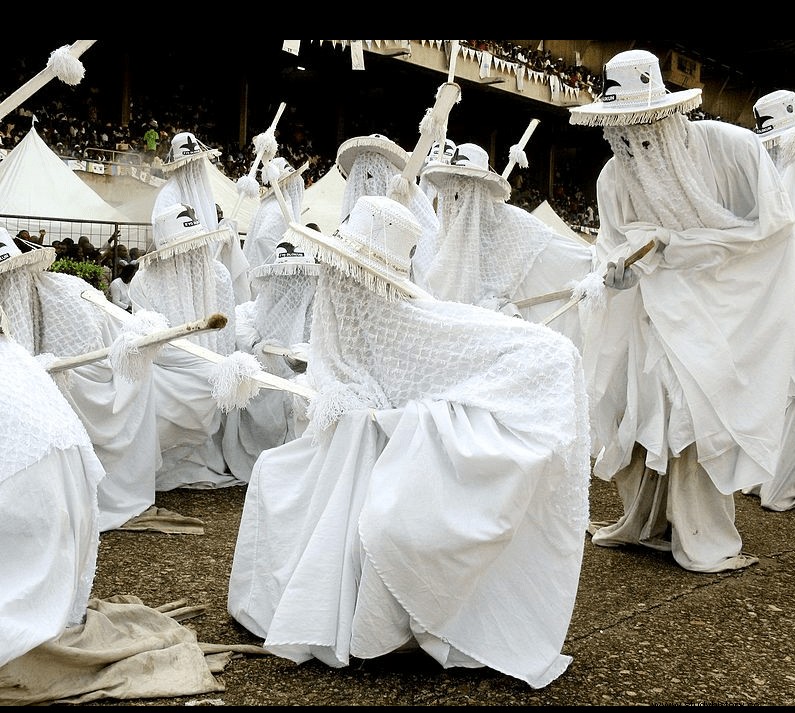
Despite the misconceptions based on mythologies, a glance at African goddesses and West African societies opens the door to innumerable and hidden meanings. For example, Olokun is an Orisha with a water spirit in the Yoruba religion. The Yorubans believe Olokun is the ruler of everything that lives in water and has authority over the water gods. And the Yorubans respect the water gods because of their omnipresence. It is especially important that the Yorubans praise Olokun for her ability to keep them prosperous, healthy and prosperous.
The Edo people in southern Nigeria still worship Olokun at festivals annually. It must be noted, however, that the West African people view Olokun as male, female or androgynous. For example, in West African coastal areas, Olokun is becoming a male form among its worshipers. While inland she becomes a female deity for her followers.
Nana Buluku, an African Goddess Approved by the Power of West African Societies
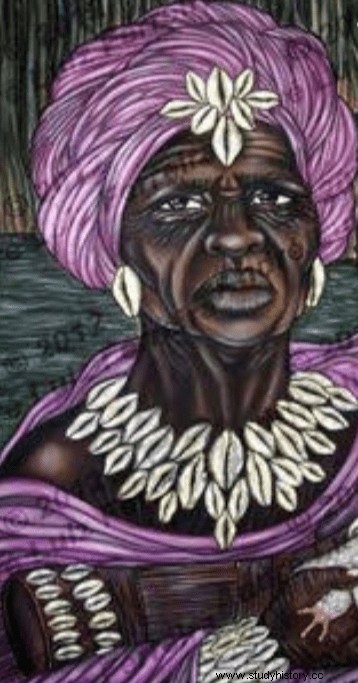
Obviously, African goddesses and African societies have mutual understanding, and we see this in the way people continue this relationship. Similarly, Nigerians see Nana Buluku as a female Supreme Being. Nana Buluku is the most influential Orisha in West Africa because many ethnic groups in Nigeria worship her. As a female supreme being, Nigerians support her as the creator of the moon spirit, Mawu, and the sun spirit, Lisa. That's why Mawu and Lisa are known for creating living beings and other smaller deities after their mother's retirement.
As I said earlier, different ethnic groups respect Nana Buluku. The Fon people in particular describe the creation of living beings by Mawu, the spirit of the moon, and look at the personality of living beings in general. First, Mawu joins the lure and the snake. Second, Mawu creates living beings that permeate the good, the bad, and a destiny.
The Fon people use the deceiver to change their destiny. They believe that a person can change their destiny if they satisfy the goddess in question. Thus, they satisfy the lesser goddesses and ancestral spirits because they believe they are the goddesses' favor.
Aja, medical doctor for the people of Nigeria
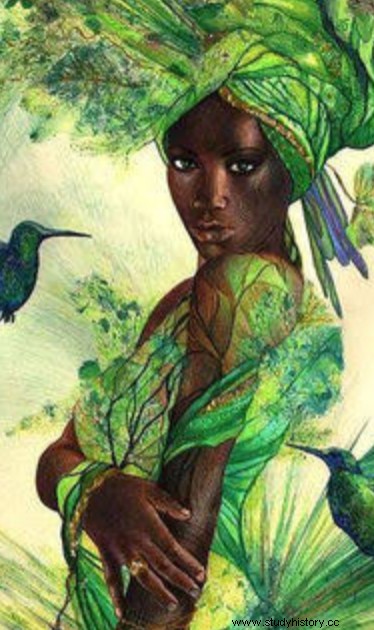
The green colors that the artist used to capture Aja resonate with what this Orisha represents. In fact, it reveals the importance of African goddesses and West African societies. In this case, Aja is the Orisha of the trees and everything that lives in it. Her home is in the woods, where she makes herbs to heal the sick. She is one of the unique Orishas. For example, she reveals herself to people, especially shamans, to teach them about the healing herbs.
There are cases where she carries a person to stay with her. During that time, Aja trains this person for a duration of between seven days and three months. In such cases, Nigerians believe that the person has visited the land of the dead. So, when the person comes back, they think the person is a powerful healer.
Ala is the Orisha of the earth and West African societies
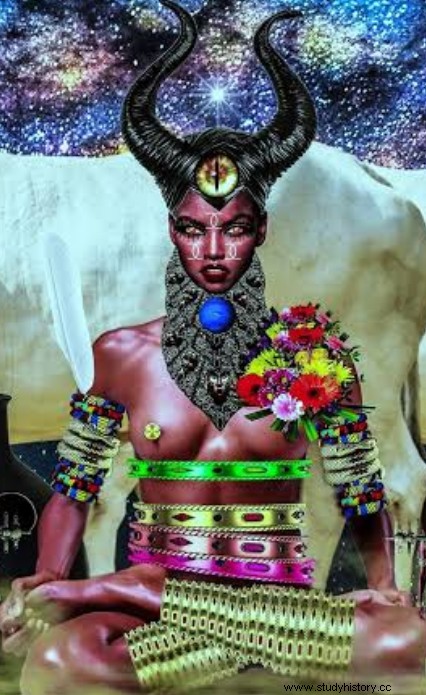
To claim that some traditional methods or approaches are a fallacy without proof or much-needed research is to jeopardize the development of social life. When I look at Ala the Orisha, the importance of West Africans and Ala, I have to say that Ala is relevant and if she gets a chance, she has the potential to change lives.
For this reason, the Igbo people in Nigeria call Ala the goddess of the mother, ruler of the underworld and guardian of autumn. She is actually the mother of things for Igbo in Nigeria. As a fertility goddess for both humans and animals, Ala's presence is necessary for a variety of reasons, making African goddesses and West African societies a relevant study.
Alas' presence in life cycles
Igbo in Nigeria inherits Ala because she is a life and therefore is present from beginning to end and continuously. According to Igbo in Nigeria, Ala is present at the beginning of a life cycle to make children grow in the womb. But not just the beginning, but Ala's presence is seen at the end of a life cycle. That is, when a person dies, she receives the souls of the dead in her womb before they can be transferred to another life.
Ala communicates with the people
Despite many misconceptions that belief in goddesses is insignificant, the ceremonial practice of Igbo in Nigeria shows itself without a doubt. And this underscores the concept of African goddesses and West African societies. According to Ala's supporters, she sends a sign such as a snake or beehive to indicate to the priest where to set up a 'Mbari'. A 'Mbari' is a ceremonial clay shrine filled with clay models of people or deities. When the sign is open, Igbo raises men and women 'Mbari', which takes years to complete.
The longer it takes to build 'Mbari' is seen as a sacred act for Igbo in Nigeria. And most importantly, it preserves the 'Mbari' tradition as the older ones pass it on to the younger generation.
The Importance of Ala for the Igbo Law
In the same way, Ala is also the goddess of morality. She rules over human morality and dominates as a result of the Igbo law known as 'Omenala'. That is, if an Igbo commits a crime or an immortality, that person insults Ala personally, spiritually, and otherwise. And an action that is avoided.
On the brighter side, Igbo in Nigeria shows respect for Ala by lighting a candle in the morning to welcome and honor Ala. They say that when a person practices this ritual, that person will receive blessings of fertility and creativity.
The Importance of African Goddesses in Anthropology
Researching the post above reminds me of the stories I read while taking my first year at university. Stories of how African ways were disturbed in the name of European superiority over other nations. This attitude of superiority scrapped many African cultures and traditions. As a result, they were declared invalid; unnecessary. Even so, it is interesting to learn that there are other African nations that practice ancient, indigenous traditions despite the destruction of African cultures during the Scramble for Africa.
